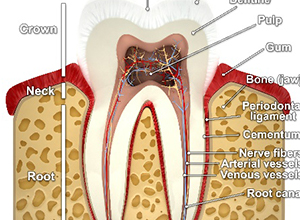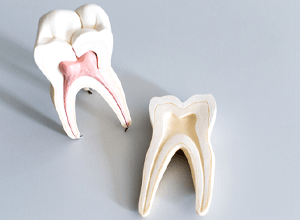Root Canal Therapy in Enfield
 When you get a toothache, you might hold back from going to your dentist in Enfield because you’re afraid you need a root canal. Sadly, this treatment has a bad reputation that it doesn’t deserve. In fact, it could relieve your pain, save your teeth, and get your smile back in its best shape.
When you get a toothache, you might hold back from going to your dentist in Enfield because you’re afraid you need a root canal. Sadly, this treatment has a bad reputation that it doesn’t deserve. In fact, it could relieve your pain, save your teeth, and get your smile back in its best shape.
What Is a Root Canal?
 The term “root canal” is often used to refer to a specific dental procedure, but the truest meaning of the term applies to part of your tooth’s anatomy. It is the pulp-filled cavity in the root of your tooth, which contains the tooth’s nerve.
The term “root canal” is often used to refer to a specific dental procedure, but the truest meaning of the term applies to part of your tooth’s anatomy. It is the pulp-filled cavity in the root of your tooth, which contains the tooth’s nerve.
When a tooth becomes badly damaged or infected, a treatment that addresses your root canal in Enfield might become necessary. Here is a breakdown of how the process usually works:
- First, your dentist numbs the tooth. You may also be sedated. You shouldn’t feel any pain during the procedure.
- Your dentist will create a tiny hole in the tooth in order to access its pulp. Then, using specialized tools, they’ll clean out the infected area and remove the nerve that was causing you pain.
- After your tooth is cleaned out, the dentist will fill it with a special material. Then we’ll close up the hole in your tooth.
- In most cases, we’ll have to place a crown after a root canal in order to protect the weakened tooth against further damage.
A root canal may take one or two visits to your “dentist near me” in Enfield. The exact steps involved in your procedure will depend on the extent of the damage to the tooth.
What Symptoms Mean You Might Need a Root Canal?
Some common signs that indicate you may need a root canal include:
- A tooth that is significantly darker than the ones around it.
- Severe pain when you eat or apply pressure to a particular tooth.
- Extreme sensitivity to hot or cold, even after the source of the temperature change has been removed from the tooth.
- A pimple-like bump on your gums near the tooth that is in pain.
- Tenderness or swelling on the gums.
These symptoms are most often the result of decay or infection, tooth trauma can also lead to the need for root canal therapy. It’s also worth keeping in mind that some people may need a root canal even though there are no symptoms; the only way to know for sure if this treatment is right for you is to visit your dentist.
What Are the Benefits of Root Canal Therapy?
 Perhaps the biggest benefit of root canal therapy is that it may save a tooth from extraction. While some people believe that extractions are better than root canals because they usually cost less and are simpler, it is always better to try to save a tooth. Keeping all of your natural pearly whites in place will preserve your oral health and spare you from an expensive tooth replacement procedure later on.
Perhaps the biggest benefit of root canal therapy is that it may save a tooth from extraction. While some people believe that extractions are better than root canals because they usually cost less and are simpler, it is always better to try to save a tooth. Keeping all of your natural pearly whites in place will preserve your oral health and spare you from an expensive tooth replacement procedure later on.
Root canal therapy has aesthetic benefits as well; the crown that gets placed after the procedure may be made of porcelain so it blends seamlessly with the rest of your smile — that’s better than having a gap in your mouth, right?
Understanding the Cost of Root Canals

The cost of a root canal in Enfield depends on a few factors. During your consultation, we will be able to provide you with a personalized price estimate. We will also help you understand your payment options, such as insurance and financing. We want the financial aspect of your treatment to be as stress-free as possible!
Factors That Can Affect Root Canal Cost

A few factors that can influence the cost of root canal therapy include:
- The location and type of the tooth. Molars tend to be more difficult to treat than front teeth, meaning they typically incur higher fees.
- The overall complexity of the case. We can handle most root canal treatments right here in our office. In particularly complex cases, though, we refer patients to an outside specialist, who has their own pricing structure.
- Additional services. You are likely to need a crown following your root canal treatment, which will add to the total cost of your care.
Is It Cheaper to Pull My Tooth?

The upfront cost of a tooth extraction is often less than that of root canal therapy. However, we urge our patients to consider the long-term financial implications of any treatment they choose. If you opt to remove an infected tooth, you should get it replaced in order to avoid issues like a misaligned bite and further tooth loss. Tooth replacement options, such as implants and bridges, can cost quite a bit. Root canal therapy, on the other hand, is usually a one-time cost that provides a lifetime of benefits. It is ultimately a better monetary value than an extraction.
Does Dental Insurance Cover Root Canals?

In most cases, yes, root canal therapy is covered by dental insurance. It may be classed as either a minor or major procedure, meaning that anywhere from 40% to 80% of its cost might be covered. You will need to check the specifics of your policy to see how it applies. Our team accepts payment from most dental insurance plans. We will be happy to help you verify your benefits and file your claims.
Other Options for Making Root Canal Therapy Affordable

As your emergency dentist in Enfield, we are eager to help you afford necessary treatment. To that end, we offer a few useful provisions:
- Most patients qualify for low-interest financing through CareCredit, a third-party lender. The application process is fast. After approval, you may be able to choose from several different monthly payment amounts.
- Essential Dental Plan. This discount plan provides reduced fees on virtually all the services we offer. It is ideal for patients without insurance.
Do not let financial concerns hold you back from getting the treatment you need! Our team is ready to help you navigate every aspect of your care, including its monetary side. Contact us today to ask questions or schedule your consultation. We look forward to serving you.
Root Canal Therapy FAQs

A root canal in Enfield might be just what you need to enjoy improved oral health. Before you commit to the procedure, however, you may want to know more about it and what to expect. We completely understand your concerns, which is why we have compiled the following list of FAQs about this treatment. If you do not see the answers to your specific questions, reach out to us directly. We look forward to speaking with you.
How Long Does It Take to Recover from Root Canal Therapy?
Each patient is unique, so there is no “universal recovery time.” Generally speaking, though, patients are feeling well enough to return to work or school the day after their procedure. If you have a physically demanding job, you may want to take at least 2 – 3 days off because strenuous exercise may slow down your body’s healing process.
You can expect your mouth to be sore for several days. Over-the-counter pain medications can help to relieve any discomfort. You should also stick to eating mostly soft foods, and try to chew them on the side of your mouth opposite from your treated tooth.
If you notice any severe pain or other unusual symptoms during your recovery, you should contact us right away.
How Long Do Root Canals Last?
In the vast majority of cases, root canal therapy is successful. It is common for patients to enjoy decades of reliable function from their treated tooth. In fact, in many cases, the results of the procedure last for a lifetime.
Of course, the longevity of your results will depend partially on how well you care for your mouth. Our team will provide detailed instructions to help you look after your oral health in the best way possible.
What Happens if You Wait Too Long for a Root Canal?
You should seek care as soon as you realize that something is wrong with your tooth. Since teeth cannot heal themselves, any issues are only likely to worsen with time. If you postpone root canal therapy for too long, your dentist in Enfield may determine that it is no longer possible to preserve the tooth. It may need to be extracted. In the meantime, you may suffer from an intense toothache. If your toothache disappears before you get treatment, that is a sign your tooth has died and requires immediate care.
Are Root Canals Safe?
You might have heard a handful of naysayers claim that root canals are dangerous. Some people claim that they can make you sick and even be a risk factor for cancer. However, there is absolutely no empirical scientific evidence to support such claims. In fact, the vast majority of research into root canal therapy has found it to be a consistently successful treatment that supports oral and overall health.
Of course, it must be noted that root canal therapy is not 100% risk-free. As with any medical procedure, there is a small chance of post-treatment problems. Your dentist can answer any questions that you may have about the possible outcomes of root canals.
